MUSINGS ON AWARENESS, Part-01
This series is based on the Awareness Course that is incorporated at the post-graduate level programs of the Sri Sathya Sai University. Its author is the Sri Sathya Sai University’s former Vice-Chancellor Professor G. Venkataraman who has been closely connected with the formulation, content and delivery of this program for more than a decade now. The series was first broadcast over Radio Sai in response to requests from many listeners seeking clarifications on many spiritual dilemmas faced in daily life. Therefore, it was presented in a simple format suited for anyone who wishes to live life in a state of Awareness as prescribed by the Supreme Teacher Bhagavan Sri Sathya Sai Baba.
In the present article, one of these radio talks has been adapted appropriately and supplemented with apt illustrations for ease of understanding.
By Prof. G. Venkataraman
The Thirst to Become Aware
What is Awareness? Bhagavan Baba says that awareness refers to a state of total understanding which in turn means realising that God is in everything, everywhere, all the time. For those who are blessed to live in the awareness of who Sri Sathya Sai Baba is, it means that Swami is in everything, everywhere, at all times.
Tracing the Journey of Being to Becoming
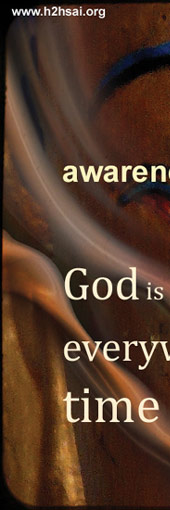 |
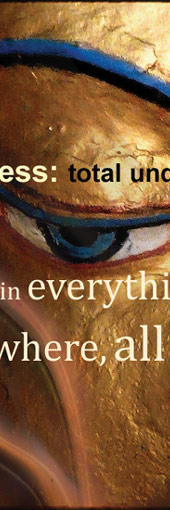 |
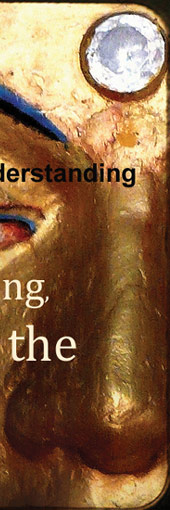 |
How do we actually experience this Eternal Omnipresence of God, and why do we have to do that?
This is the topic that will be explored in many different ways, but will not end with a discussion of just the concept of omnipresence. The discussion will not only provide a broad overview of what the students of the Sri Sathya Sai University learn but also the rationale behind the program and its universal relevance and appeal to everyone, everywhere. The Awareness course at the university is yet another practical example of the universal appeal, application and relevance of the teachings of Sri Sathya Sai Baba.
Inevitability of Action – Voluntary and Involuntary
Action is inevitable. An individual has to engage in actions, many of them being involuntary like breathing, for example, and many others being consciously decided upon by the individual concerned. Given the inevitability of action, the question arises: “How do we act? Are there ground rules that must be observed? Are there do’s and don’ts?”
To answer such questions, we must first consider how human beings relate to the entities and the environment in which they are embedded. This discussion is required because action always takes place in a particular setting and a particular ambience.
The Golden Triangle
One way to discuss this question is via what we call the ‘Golden Triangle’. Imagine an equilateral triangle with God at the top vertex, and man at the bottom left hand vertex. On the right vertex at the bottom, we place Society and Nature together. Let us now see how man relates to God on the one hand and to Society as well as Nature on the other.
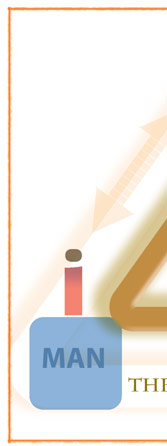 |
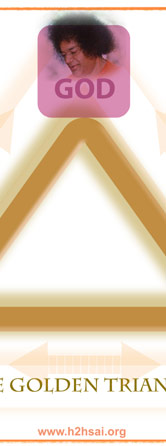 |
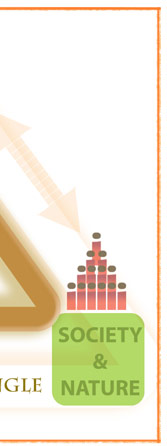 |
Typically, the individual functions in a disjointed manner, that is to say, when man thinks of God he is not bothered about Society; when he deals with Society, God does not enter into the picture and when he relates to Nature, God and Society are usually not considered relevant.
Man forgets God not only in dealing with his fellow human beings but also in dealing with Nature. Thus it is that we see wide-scale destruction and ravaging of the environment and the eco-system. |
Let us work with the example of a person who believes in God. This individual therefore worships God, offers prayers, etc. Basically, she/he wants to please God so that He would grant all kinds of favours and shower Grace on them and their family. Usually, that is where it all stops, and the person in question is not concerned about the welfare of others. Seeking such favours from God is an age-old tradition, and Lord Krishna has commented in the Gita that among the various types of devotees He has, the seeker of personal favours is a prominent type.
Let us follow this devotee who regularly worships God even as (s)he goes out into the world for doing business, plying a trade or whatever. This is where problems start. The moment one becomes immersed in worldly affairs, we usually forget God and with it a lot many important things, especially the need to follow Sathya and Dharma or to practice Truth and Right Conduct in all our worldly transactions. Thus it is that we find humans engaging in all kinds of questionable practices and abandoning values in the pursuit of their daily vocations.
 |
 |
 |
A businessman may indulge in shady deals, justifying it all as not only a necessity but also as perfectly valid and just, given the Nature of the business world. Remember the old saying: “All is fair in love and war”?
That so-called license is now extended to other domains as well. In a similar manner, we find politicians being corrupt, justifying it in their own particular ways, since many have come to believe that corruption is an essential survival skill in the murky world of politics; likewise, many doctors become more concerned about their fees rather than about caring for patients, and so on.
Fracture in the Golden Triangle
Such deviationist behaviour is so common that we need not spell them all out in piteous detail. In the behaviour of most people, there is a serious disconnect between the actions they perform and their intrinsic divine Nature that Swami keeps on reminding us all the time about. In other words, there is a fracture of the Golden Triangle.
Man forgets God not only in dealing with his fellow human beings but also in dealing with Nature. Thus it is that we see wide-scale destruction and ravaging of the environment and the eco-system.
If individuals pollute in an innumerable number of ways, so do the big corporations; only, the scale on which they pollute is often massive.
Need for a Pantheistic Vision
We often forget that God is omnipresent; that the divine not only resides in every human being as the resident spirit or life force, but also in Society and every entity of creation in both physical and subtle forms. As a result of this amnesia, we are more likely to develop a split spiritual personality.
We may believe in God, worship and pray to Him on a one-to-one basis, but when it comes to dealing with others, community, Society, and Nature, we can act in total violation of this truth and the human values latent in us. We fail to recognize the same God that we worship in private as being present in Society and in Nature.
Individual Power Propels History in Either Direction
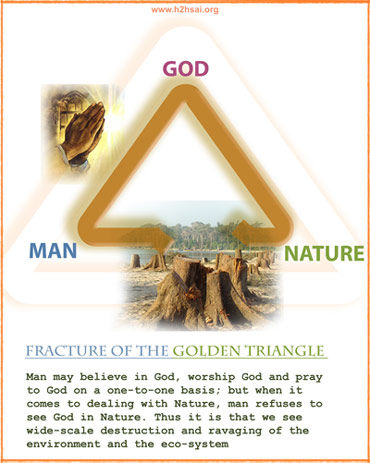 |
|
Throughout history, there have been people big and famous as well as unknown individuals, who believed in God and then went about doing all the wrong things, sometimes, even in the name of God. The point is far from trivial since misguided individuals often trigger huge waves of immorality and even extreme violence.
So what it all boils down to is that when we act, we ought to be keenly conscious of the ambience in which we function. We must of course first of all realise that we all are children of God, the same God by the way, no matter to which religion we belong. Next we must realise that we live on a planet called Earth, which is a part of Nature.
Divine Generosity Pervades Nature
All humans live on the same planet but no one owns the planet; this we often forget. In fact, God is the owner, and He has most kindly allowed us to live on it free of charge.
And while allowing us to live, God has also most compassionately provided many services to go along with the free accommodation, such as air to breathe, water to drink, and sunlight to enable us to see.
Notice incidentally, that God does not keep the Sun on for 24 hours in any one place because we also have to sleep and we rest best when it is dark.
You might contest my statement by saying that in the North and South Poles, the Sun is not seen for many months at a time during certain parts of the year. That is indeed true, but then how many people live on Antarctica anyway. We have to concede that God has been very kind and considerate to us in numerous ways. And we just cannot afford to forget His presence in Society on the one hand and in Nature on the other.
Place of God in Society
At this juncture, several questions need to be addressed:
- What is the meaning of the statement that God is in Society?
- How is one supposed to see this God hiding in Society?
- How do we relate to God’s immanence in Society?
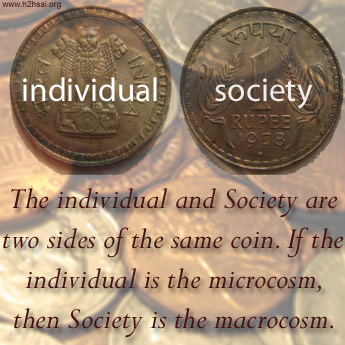 |
|
Let us start by agreeing that all creation is sacred and God is latent in each and every one of us, without exception. Some people may question this assumption saying, “How can that be true? How can one believe that God is present in a murderer, for example?” This is a good question that shall be tackled at an appropriate moment in the discussion. Meanwhile, let’s work with the premise of God’s presence in all without exception.
Vedic Verdict: Sacred Parts Make a Sacred Whole
This follows that God is present in Society also, for what is Society but a collection of individuals? So we come to this important conclusion namely, that the individual and the Society are two sides of the same coin. If the individual is the microcosm, then Society is the macrocosm.
Bhagavan Baba has declared that Society is God, adding that this concept goes back to Vedic times. In this context, He often chants a Vedic hymn that begins with the words: Sahasraseerusha Purushaha!
Explaining the meaning of these terms, Bhagavan Baba says that when the Vedas proclaim that God has a thousand eyes, two thousand feet and so on, it does not mean that God is a grotesque figure with such strange physical features.
It simply means that Society is a macro manifestation of the individual and that God is immanent in Society the same way He is immanent also in the individual.
It is for that reason one must serve Society, for when we serve Society in the spirit of selfless love, we are in fact serving the Lord Himself. Hence, the popular sayings of Bhagavan Baba such as: “Hands that serve are holier than lips that pray” and “Service to man is service to God”.
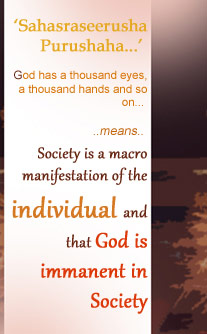 |
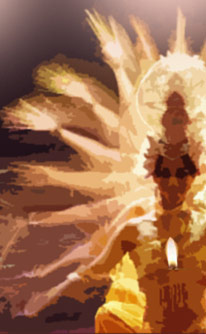 |
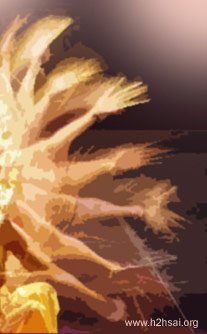 |
Utopia: A Fantasy or a Possibility?
There is also another point that needs to be kept in mind in connection with the relationship between the individual and Society. Everyone wants to live in a good Society - one that provides all kinds of securities like life security, food security, job security, etc. The dream for an ideal Society is nothing new; in India, the concept of an ideal Society goes at least as far back as the Ramayana, where the ideal Society was called Rama Rajya, where there was peace, justice, absolute fair play, rule of Dharma or righteousness, to be differentiated from the rule of law, an important nuance that we will study closely further on. In the West too, there has always been a dream of an ideal Society and the name given to it was Utopia.
The general belief is that Utopia is an unattainable ideal. Swami stresses that is not true. If individuals living in a Society lead disciplined and righteous or dharmic lives, Society which is nothing but the individual magnified to macro levels would also be dharmic.
Swami said that higher learning does not mean advanced courses in physics, computer science, etc. Yes, His educational institutes do offer advanced degrees in various subjects but that is not the true meaning of higher learning. |
Issues like security, peace, tranquillity, etc., relate in a very strong way to the manner in which the individual relates to the Society as a whole. If there were micro discipline then there would automatically be a strong semblance of macro discipline also. However, if the individual does not care about Society, then there can be macro consequences as well. For example, if everyone throws trash out into the streets, then there could be all kinds of health hazards that Society as a whole would have to face.
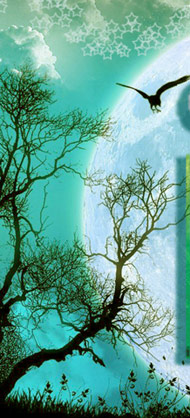 |
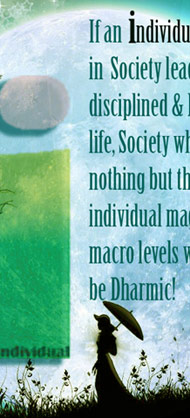 |
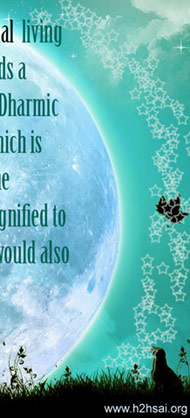 |
Let us remember that it is not merely individuals but also individual companies that can, pursuing their own profits and self-interest, cause any number of problems to Society. For instance, portraying too much violence in the cinema and TV may earn profits for the producers but it also helps to promote growth of violence in Society. In other words, it is only if the individuals unfailingly follow dharma that security of the various kinds I listed earlier would prevail in Society.
Cells Define the Body
When individuals follow discipline, order also prevails in Society because Society is nothing but the macro of the micro. Can we have healthy body if most if not all the cells are cancerous? One cannot say: “Let the body be healthy; then the cells would automatically be normal.” This kind of argument does not work. Whether we like it or not, the game really starts with the individual. Hence each individual needs to have the right perspective and a sense of responsibility with respect to both the Society and Nature.
 |
 |
 |
There is also a strong connection between the action of individuals and the ecosystem. In the poor countries the impact occurs in one way while in the rich countries it happens in a different way. For instance, in poor countries, farmers may overgraze and cause havoc to the land; such desertification can and will affect the weather both locally and globally. Similarly, excessive burning of fossil fuels in rich countries is now threatening to cause warming of the weather globally.
Disastrous Disconnect
Thanks to the rapid strides in technology on the one hand and the enormous growth of population on the other, individuals, companies, industries, etc., can bear large scale impact to both Society and the ecosystem as they pursue their profits relentlessly. Such impact starts with undesirable thoughts that arise in the mind, and that happens when individuals break the Golden Triangle, that is to say, there is a disconnect between the way they relate to God on the one hand and the manner in which they relate to Society as well as Nature on the other.
Translating Higher Learning into Higher Living
This is where Bhagavan Baba’s teachings come into the picture. Speaking during the fifth convocation of His University, Swami said that higher learning does not mean advanced courses in physics, computer science, etc. Yes, His educational institutes do offer advanced degrees in various subjects but that is not the true meaning of higher learning.
Higher learning, said Swami, is NOT meant to make the student a recluse, a sanyasi who may withdraw to the Himalayas. On the other hand, higher learning is meant to help the students to be very much in the world and lead normal lives but with a different perspective. What is that perspective? According to Baba, it means seeing God in Society as also in Nature.
 |
 |
 |
Let us say there is a doctor. Usually, a doctor is concerned with helping sick people to get back to normal health. However, reality demands that doctors also have to live, and so they charge fees, which makes complete sense. Some doctors, however, are more concerned about the fees rather than their primary duty of dispensing treatment and relief to patients, and these days, many hospitals in India ensure advance payment in full before treating the patient.
Now you might argue, with some fairness too, that treatment costs money. That is true and doctors do have to charge fees. However, that does not mean that the poor people have to be summarily thrown to the wolves. Every consulting physician, for example, could say set apart one day in a week when she/he sees poor patients who cannot afford consultation charges. To the extent possible, the doctor could also give medicines based on the free samples that are given to them liberally by the pharmaceutical companies.
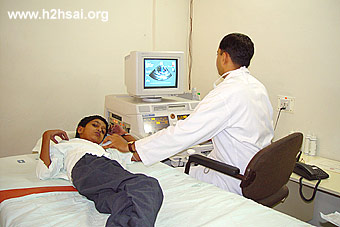 |
|
There are many variations of this theme. For example, in Swami’s General Hospital in Bangalore, most of the doctors who do OPD work are city doctors who work once a week in Swami’s Hospital on an honorary basis. Different doctors come on different days, and this way, the doctors give something back to Society in an absolutely selfless manner, with no strings attached.
It is not doctors alone who can help. A lawyer, for example, can also help by taking on a few clients who are poor and need legal help. An upper middle class family can pay for the education of the child of the domestic help in their home. Money is not always required to do service; what is needed is the spirit and a firm determination. Often, people who serve Society are driven to do so by an inner call, as was the case in a few recent instances.
Raju and Sridhar Respond to Inner Prompting
The first concerns an auto rickshaw driver in Bangalore. This young man Raju was twenty-five year old or so. He was quite a rough chap, often given to violence, and also petty crime at times. His behaviour was so bad that his parents often wished that he were never born. One fine day, something happened to Raju. He saw a lot of suffering and injustice, and became very angry that so many people were getting such a raw deal.
Angry though he was, he realised that he could not set things right all by himself. He then decided that he could at least try and alleviate the suffering of a few. Thereafter, he began picking up people lying in the street and on the verge of death. He would bring them home, clean them up, give them food and care for them. All this he did with his earnings.
His parents were stunned by this amazing change in his attitude, but soon they found he was bothering them in a different way by bringing all kinds of sick people home. But Raju was determined to help. And when these people died, he gave them a decent funeral.
It was not always that he brought home only old people; soon the people whom he rescued ranged from small children to young women who had been abused and so on. Later he managed to get some space where all these people could stay. Slowly, the word spread and Raju’s efforts came to the notice of some non-governmental organizations or NGOs who pitched in and Raju’s service activities slowly snowballed.
Handicap No Barrier to Serving
My next example is that of a young man, at that time eighteen. This man named Sridhar belonged to a middle-class family in the city of Chennai, formerly known as Madras. He was afflicted with polio in his childhood and that shattered his early life, denying him an opportunity to attend school, play, etc. Being handicapped, people also began to ignore him; and some did not hide their dislike for this poor boy whom they saw as a burden. But Sridhar had spirit in him. He spent a lot of time listening to the BBC and that made him pick up English though he did not attend school.
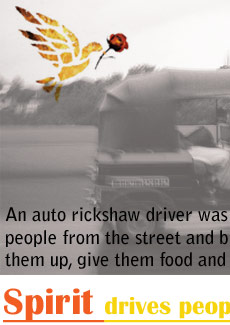 |
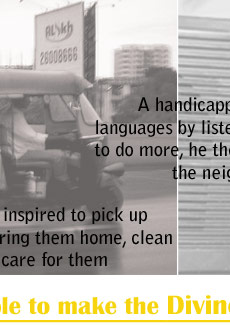 |
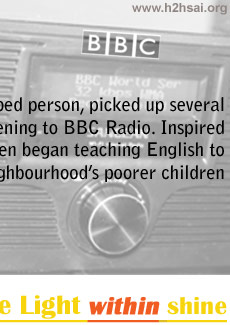 |
BBC came to know of this and gifted Sridhar a good short-wave radio. I believe he also picked up German simply by listening to the radio. One fine day, Sridhar decided he would help others and started teaching the son of the maidservant who worked in his house. Word spread, and soon other servants working in houses on the street where Sridhar lived began to send their kids.
Pleased with all this, some relatives gave him a wheel chair, which increased his mobility. Great spirit is often infective and soon other boys in the neighbourhood were inspired by what Sridhar was doing. They said, “If this boy who is handicapped can do so much, we ought to do more.” As a result, they joined Sridhar and formed a club that made service its goal.
There are many such wonderful stories but unfortunately, they do not make it to today’s newspapers, which are mainly concerned with celebrities, sleaze, scandals, and violence. So much for the moral responsibility of the media to the Society!
Same Life Force Drives Different Forms
What these two stories teach us is that it is not money but the spirit of man that drives people to let the divine light within shine. One need not complain about one’s situation; instead one can look out and find out how to help. Bhagavan Baba reminds us to: “See the other person as no different from yourself and then you will feel that person’s pain as your own. When that happens, you will not wait; you will just plunge into service, loving and caring.”
In the Gita, Sri Krishna told Arjuna, “The only right you have is to do your duty. Do that properly, with love and as an offering to God; He will then take good care of you |
One thing that emerges from all that I have been saying is that the individual simply cannot conveniently isolate himself or herself from Society as if nothing is owed. Think of an unfortunate country like Chad in Africa. The country is desperately poor, has no infrastructure, no services, etc. There are many countries in that same bracket; they are called failed states. Now imagine a young person in one such badly failed state. Such a person would have no chance of a decent education, and even if he did somehow manage to get educated, he would have a hard time getting a decent job.
A senior official of Microsoft once remarked so rightly when he said: “We recognise how much we owe to Society. Without Society and the educational establishments it supports, we would not have the engineers we hire. Without Society, we would not have electric supply, roads, airports, waterworks, hotels…on all that we depend so much for our work. Last but not the least, without Society and its business facilities, there would be no market for our products.” In today’s world, the individual and Society are tightly coupled and one cannot separate one from the other.
Responsibility and the Spirit of Youth
 |
|
These are days when many people, young ones in particular, strongly believe that nothing must impede their freedom. This attitude has produced many unfortunate consequences, of which I would like to comment on just one - the neglect of elderly parents, especially when they cannot take care of themselves.
Once upon a time, it was the norm for the sons to take care of their father and mother in their old age. But since World War II, that has changed, not only in the West but also in the developing world, including India and China.
In the affluent countries of the West, those who can afford, retire at Senior Citizens’ Homes, where all the old hang out together so to say. The children are thus freed from the responsibility of attending to and physically taking care of their elderly parents when they are sick and helpless.
Instead, their duty is now reduced to visiting the parents once in a while. If they become terminally ill, they are moved to a hospice. But what about countries like India and China? It is a very different ball game, especially where the middle class is concerned.
It is very common for a young man after he gets married, to find himself in a nutcracker grip. Duty to the parents pulls him one way while his wife wants none of the chore of looking after oldies and pulls him the other way. Thus, millions of old people are abandoned and their situation is miserable.
 |
|
In China, till recently, the state took care of the old but now, with country having opted for a capitalistic style of economy, the state has declared that the job of looking after old people must be done by the sons and daughters. That of course is definitely not happening, and as a result, there are massive social problems in the Society.
Resonating this unfortunate reality, the Chinese New Year celebrations in Prasanthi Nilayam in February 2007 highlighted the theme of filial piety and lamented how the tradition of caring for old parents was being jettisoned in the name of progress.
In some countries like Japan where birth rate is declining and the population is aging rapidly, there are again problems associated with the elderly. Many young people may present their side of the argument regarding this matter as a natural consequence of our times and its reality. They may argue: “Listen, we realise there are problems but you must also understand that times have changed and things cannot be the same as before.
These days, both the husband and the wife have to go out to work ….” Their logic is understandable but the situation lends itself to the question that every young couple must pose to themselves: “How would I feel if I am driven out of home when I am old, discarded like a worn-out shoe or something like that?”
Some Debts Cannot be Written Off
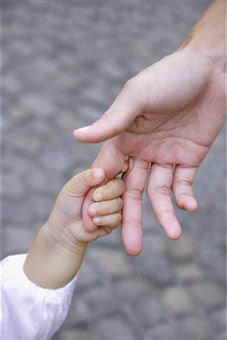 |
|
Life style might have changed but one thing has NOT changed and cannot change. The expectant mother still has to carry the baby for about nine months, and labour pain remains the same. After birth, the mother has to feed the baby at regular intervals, clean it up when needed, change diapers as required, etc.
Almost all children learn the language they speak from their mothers. This applied then and applies today too, from tribal communities in the depths of Africa to educated communities in advanced countries. That is why the first language of every person is called their “mother” tongue.
Microprocessors and space ships have not changed the basics of motherhood in its essentials. That being the case, every child owes an enormous debt of gratitude to his or her mother. Can any argument wipe out this debt?
Rights versus Responsibilities
This leads us on to an important issue: which is primary: rights or responsibility? Those who are passionate about their personal freedom would vehemently argue in favour of rights. As against this, there is the traditional wisdom that stresses duty and responsibility over rights.
What are Swami’s views on this? They are very clear; Swami puts responsibility over rights. In the Gita, Sri Krishna told Arjuna, “The only right you have is to do your duty. Do that properly, with love and as an offering to God; He will then take good care of you and your needs.”
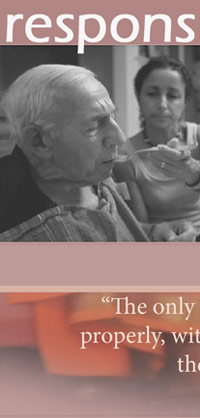 |
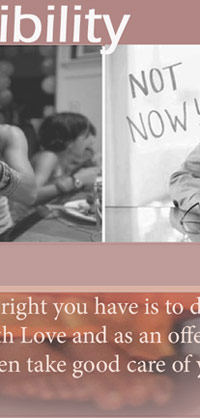 |
 |
The highlights of this Awareness discussion can be summarized as follows:
- Awareness means realising every minute that God is present everywhere, in everything, all the time.
- This realisation is needed so that we act properly in relation to others, to Society and to Nature. God is present in others, in Society and in Nature, and is watching us all the time. So we have to make sure we do not do anything that goes against God.
- This teaching is well known. However, people do not behave this way. To explain why this happens, we reviewed the concept of the Golden Triangle that links man to God on the one hand and to Society as well as Nature on the other.
- As the result of convenient factorisation, man breaks up this triangle to worship God in private while at the same time going against Him when he deals with Society. If one cheats Society, it is a betrayal of God and no amount of personal worship would wipe out that treachery.
- As Swami says, we are what we are because of Society. Thus, we must start not by demanding our rights but by recognising our responsibilities.
- In particular, young people have to appreciate the sacrifices made by their parents and take good care of them in their old age, instead of discarding them as objects that have served their purpose. If this one lesson is absorbed well by the youth of today, then millions and millions of parents would be saved from their present state of abandonment
Jai Sai Ram.
Dear Reader, did this article help you in any way? Please share your feelings with us by writing to h2h@radiosai.org mentioning your name and country. Thank you for your time.
- Heart2Heart Team





